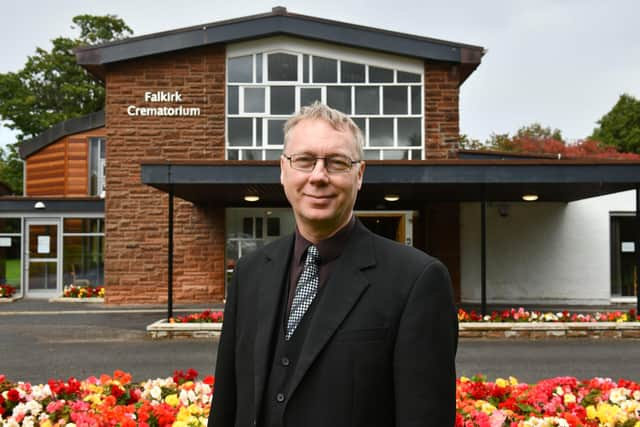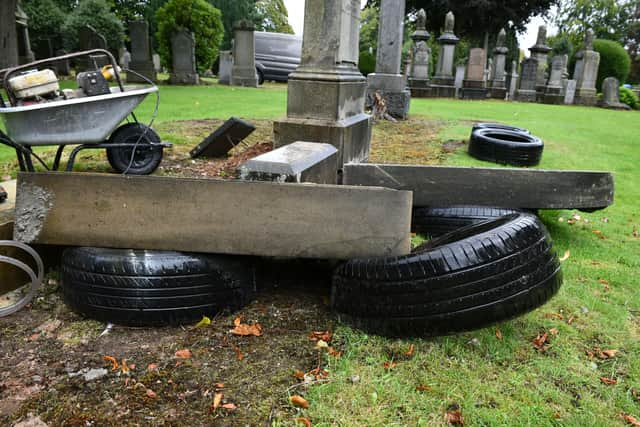Challenges facing Falkirk Crematorium staff during Covid-19
and live on Freeview channel 276
But what about those who have worked throughout this pandemic to ensure that our relatives receive a fitting send off, even in the most strange of circumstances.
They have had little recognition for the work they continue to do to keep mourners safe as they say farewell to their family and friends.
Advertisement
Hide AdAdvertisement
Hide AdStaff at Falkirk Crematorium and in cemeteries across the district have faced many difficult days since restrictions were put in place.


In the first phase only the immediate family were allowed to attend funerals but now that the country is in phase three this has been increased to 20 people in the crematorium’s main hall with the seats all placed apart and no standing room.
A few more people can be accommodated in the waiting room with a TV showing the service.
Live streaming of services has been adopted by many local authorities as a way of letting as many people participate as possible, even if they cannot be there in person.
Advertisement
Hide AdAdvertisement
Hide AdAlthough the Scottish Government is still discouraging singing at services, they can now have the service of an organist, although many chose to use recording of favourite songs or hymns.


Crematorium manager Wullie Candlish admits that despite working in the facility for the 27 years, the last few months have been the most challenging.
He said: “Nowadays 75 per cent of funerals are a cremation and 25 per cent are a burial. People appreciate that they have to follow these rules at the moment, including social distancing, but it’s not been easy for anyone.”
He and the other crematorium staff have been helped with their increased workload in recent months by a team of volunteers from other council departments keen to help out.
Advertisement
Hide AdAdvertisement
Hide AdTheir tasks have included helping to clean the hall after every service and compiling Track and Trace details of those attending, as well as helping to ensure the smooth running of funerals.
Allana Hughes is one of those volunteering and admits that her time spent in the crematorium are very different from her day job as the Zetland Park project officer.
She said: “I didn’t really know anything about what went on in this building and I’ll admit that I was a bit nervous about being in contact with people when everyone else was being told to stay at home.
“However, I’ve found it really interesting and very rewarding to be involved in this way.”
Advertisement
Hide AdAdvertisement
Hide AdFalkirk Council embarked on a £3.2 million upgrade of the crematorium in 2017 when no funeral services took place for five months, although they still carried out cremations.
As well as replacing the cremators, the hall was extended to allow more mourners to attend and the 1960s building was fully upgraded.
However, the increased use in the early days of the pandemic led to a need for more work to be carried out.
A council spokesperson said: “The importance of the crematorium as a facility and the dedication of its staff was noted during the Covid-19 pandemic. This service has unfortunately seen the facility in greater use than normal and, given the increase in death rates during March, April and May this year, there was a greater need for essential maintenance work to take place.
Advertisement
Hide AdAdvertisement
Hide Ad“An issue with the performance of the cremation equipment was encountered during this period and, given the impending risks to the service arising from Covid-19, the council took mitigating actions to carry out servicing works and purchase an additional temporary cremator. This ensured the ongoing operation of the service and offers resilience should any upsurge in Covid-19 arise.”
The new cremator project cost £300,000.
The council is also carrying out ongoing work in Camelon and all its cemeteries to ensure the safety of staff and visitors.
A tragic incident in Glasgow in 2015 when an eight-year-old boy playing in a graveyard was killed by a falling stone highlighted the need for local authorities to have protocols in place to ensure gravestones were safe.
Unstable headstones are having their foundations fixed while large trees, whose roots often the cause of stones to become loose, are being cut down. The council has a £100,000 annual budget to carry this out.
Comment Guidelines
National World encourages reader discussion on our stories. User feedback, insights and back-and-forth exchanges add a rich layer of context to reporting. Please review our Community Guidelines before commenting.